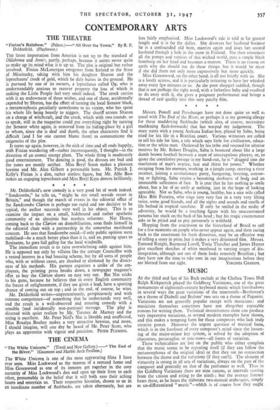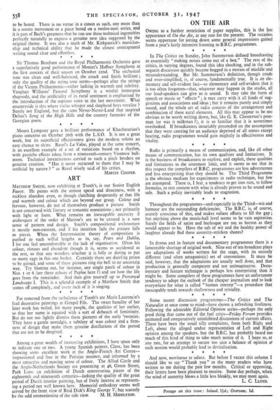MUSIC
AT the third and last of his Bach recitals at the Chelsea Town Hall Ralph Kirkpatrick played the Goldberg Variations, one of the great monuments of eighteenth-century keyboard music which foreshadows in several ways the great variations of the nineteenth—Beethoven's on a theme of Diabelli and Brahms' two sets on a theme of Paganini. Variations are not generally popular except with musicians : and musicians themselves sometimes have not altogether reputable reasons for writing them. Technical inventiveness alone can produce very impressive variations, as several modern examples have shown, and this makes a tempting form for those composers who lack truly creative power. Moreover the urgent question of musical form, which is in the forefront of every composer's mind since the loosen- ing of the major-minor key system, is solved by the adoption of chaconnes, passacaglias or tone-rows—all forms of variation. These technicalities are lost on the public who either complain that the music seems to be repeating itself (if they can follow the metamorphoses of the original idea) or that they see no connection between the theme and the variations (if they can't). The element of virtuosity is strong in all sets of variations, always on the part of the composer and generally on that of the performer as well. Thus in the Goldberg Variations there are nine canons, at intervals starting from the tnison and rising to the ninth ; but the average listener hears these, as he hears the elaborate two-manual arabesques, simply as un-differentiated "music "—which is of course how they ought
to be heard. There is no virtue in a canon as such, any more than in a sonata movement or a piece based on a twelve-note series, and it is part of Bach's greatness that he can use these technical ingenuities perfectly naturally to express a genuine new idea suggested by the original theme. It was also a mark of Mr. Kirkpatrick's musieian- ship and technical ability that he made the closest contrapuntal writing sound clear and effortless. * * Sir Thomas Beecham and the Royal Philharmonic Orchestra gave a superlatively good performance of Mozart's Haffner Symphony at the first concert of their season on October 22nd. The orchestral tone was clean and well-balanced, the attack and finish brilliant ; only the quality of the string tone seems—perhaps after the strings of the Vienna Philharmonic—rather lacking in warmth and subtlety. Vaughan Williams' Pastoral Symphony is a wistful homespun rhapsody, and the artificiality of its rural sentiment is emphasised by the introduction of the soprano voice in the last movement. What countryside is this where violas whisper and shepherd boys vocalise ? Surely not England, but the same Never-Never-Land that inspired Delius's Song of the High Hills and the country fantasies of the Georgian poets.
* *
Moura Lympany gave a brilliant performance of Khachaturian's piano concerto on October 26th with the L.S.O. It is not a great work, but its superficial effectiveness gives the modern soloist an easy chance to shine. Ravel's La Vake, played at the same concert, is an excellent example of a set of variations based on a rhythm, with pastiche effects taken f rem a nineteenth-century Viennese ball- room. Technical inventiveness carried to such a pitch borders on genuine creation. "Has it never occurred to them that I may be artificial by nature ? " as Ravel wisely said of his critics.
MARTIN COOPER.



































 Previous page
Previous page